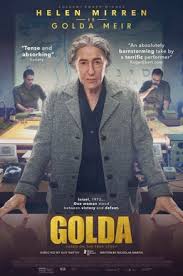
GOLDA
UK/US, 2023, 100 minutes, Colour.
Helen Mirren, Camille Cottin, Liev Schreiber, Henry Goodman, Rami Neuberger, Lior Ashkenazi, Ed Stoppard.
Directed by Guy Nattiv.
Perhaps the title should have been Golda: The Yom Kippur War. Some audiences approaching the film might have been hoping for a full biography/portrait of Israeli Prime Minister Golda Meir. But, it has a particular focus, 1973, the place of Golda Meir in Israel’s history, leadership, the buildup to the war, the attack by Syria and Egypt, how prepared Israel was for the war, responses, strategies, cabinet meetings, decision-making, interactions with the Americans, especially through Richard Nixon’s Secretary of State, Henry Kissinger.
There is some background given throughout the film, the fact that Golda Meir grew up in Ukraine, Jewish family, persecuted by Cossacks. There is mention she has a son. And, during this period, she was quite unwell, in fact, dying in 1978.
There have been many documentaries about Golda Meir but audiences who would like a feature film treatment, there is a 1982 film for television featuring Ingrid Bergman in her last role as the Israeli Prime Minister – and Australian actress, Judy Davis, portraying the younger version of her.
While the film is about the war, there are no re-constructed war sequences. Rather, the film relies on news footage of the period, in black and white, inserted into the discussions throughout the film. And, at some time, inserted are episodes with actual Golda Meir, especially at the end in the discussions about the peace treaty with Egypt and Egypt acknowledging Israel as a nation, the discussions with Anwar Sadat. When Henry Kissinger appears, there is actual footage of him arriving in Israel and the transition to Liev Schreiber with sufficient resemblance.
But, of course, the focus is on Helen Mirren’s performance as Golda Meir, the excellent make-up and prosthetics (Oscar-nominated), then, stances, manner of walking, experiencing her illness, her shrewd assessment of her cabinet, of the tactics of the war, her concern about the dead, a little notebook where she meticulously entered the number of deaths, her visit to the mortuary, her presence when coffins were landed at the airport… Helen Mirren, Oscar-winner for performance as The Queen, is certainly one of the greatest actresses of the time.
The film was released before the Hammas attack on October 7, 2023 – the action of the film going back to 1973, October 5, half a century. There are intimations of the attacks, the range of cabinet meetings and discussions, the role of the hero of the 1967 war, Moyshe Dayan, relied on by Golda that indicating some tremors and health, and there is the adventurous Ariel Sharon, later to be prime minister. And a range of other authorities, the head of Mossad, the head of intelligence, political advisers. On the personal side, there is a continued care and advice of Golda’s assistant, Lou, Camille Cottin.
We watch the details, the succession of days of the war, the strategies, decisions, the attack by Syria and its being repelled, the tactics of Anwar Sadat and the Egyptians, his presumptions of victory, thwarting presumptions, and the continued discussions with the United States, its interests, the oil embargoes of the period.
Audiences watching this film in 2024 will be making comparisons with the Hammas attack, the response of Benjamin Netanyahu and the Israeli government, tactics, bombings, Palestinians in Gaza (not named in this film), the United Nations, numbers of deaths, famine.
- The title and focus, on Golda Meir herself, her role as Prime Minister, 1973, the Yom Kippur War?
- Audience knowledge of Golda, of the war? Older audiences? Younger audiences? Israeli audiences? US audiences? Those outside Israel?
- The film completed before 7 October Hammas attack? Watching this film in the light of the 2023-2024 war? Comparisons? Judgements?
- The focus on the month of the war, initial background information, the state of Israel, the 1967 war, this war 25 years after the establishment of Israel? Attitudes of the Arab countries? The intentions of Syria and the attack? The intentions of Egypt and the attack?
- The portrait of Golda, Helen Mirren’s performance, the look and mannerisms, the make up and prosthetics? Her age, state of health, to hospital, tests, Lou as companion, support, advice, comfort in the difficulties, especially the number of deaths and wounded?
- The portrait of the Israeli advisers, the head of Mossad and his information, the head of security and the later revelation of the listening devices turned off, keeping that secret, the military leaders, Dayan and his past, his advice and success, oncoming illness, Sharon, being aggressive, contrast with David Lazar, “Dado”, the various meetings, discussions, alliances, differences, resolution, Golda listening, making decisions?
- The role of US, the quotes from Richard Nixon, the year of Watergate, the Vietnam war, the role of Henry Kissinger, friendship with Golda, his visit, the phone calls, America’s interests, Arab countries and oil resources, advice, on ceasefire?
- The human interest, the mother at the secretariat and her son being prisoner, the visuals of the captured prisoners, news of his death? Golda, sympathy and comfort? Her listing of the dead in her notebook? The visit to the morgue, the delivery of the coffins at the airport? Her grief, yet tough stances?
- The progress of the war, three weeks, the defeat of the Syrians, the role of the Egyptians, Anwar Sadat? Five years later, Egypt acknowledging Israel, the signing of the treaty, the friendly sequence and the chatter between Golda and Sadat? The lasting consequences of this 1978 agreement?
- The framework of the film, the board of enquiry, Golda’s presence, testimony, the flashbacks, the final judgement?
- And the preponderance of cigarettes and smoking, for 1973, for Golda’s health, or consequent anti-smoking campaigns?